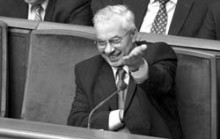Late last week the government submitted the bill “On the 2005 State Budget of Ukraine” for consideration by parliament. Even though the bill shows robust growth for all economic indicators, First Vice Premier and Finance Minister Mykola Azarov, who presented the bill, got a thorough grilling from opposition MPs. This time one must give the opposition deputies their due, as they contented themselves with verbal arguments instead of resorting to fisticuffs, as is often the case during deliberations on bills of such magnitude.
According to Azarov, revenues in the 2005 consolidated budget will come to UAH 110.5 billion ($20.8 billion) versus expenditures of UAH 118 billion ($22.2 billion). Thus, for the first time since independence Ukraine’s consolidated budget exceeds UAH 100 billion. According to government forecasts, this year’s GDP will grow by 12.4% and by 8.6% in 2005. Much like in 2004, consolidated budget expenditures in 2005 have been planned at 28.5% of the GDP. The 2005 budget deficit has been planned at UAH 5 billion ($0.94 billion), or 1.3% of the GDP. According to Azarov, of the 115 recommendations in the budget resolution drafted by the government, the 2005 draft budget incorporates 96 recommendations completely and 18 recommendations in part. The government was unable to take into account all the proposals, because enacting them would require amending the law, he noted. He further said that over January-August 2004 real GDP growth came to 13.6%, while the trade surplus remained at $2.4 billion, which made it possible to maintain a stable hryvnia exchange rate. “The dynamics of implementing the state budget this year have laid a sound groundwork and stable basis for making not only ambitious but also well thought-out and calculated decisions to continue economic reforms next year,” Azarov said.
Speaking for the parliamentary budget committee, opposition MP Petro Poroshenko of Viktor Yuschenko’s Our Ukraine bloc lashed out against the government’s budget bill. Poroshenko thinks the government has undercut the GDP growth forecast, which could signal the loss or concealment of an amount in excess of UAH 8 billion ($1.5 billion) in the revenue part of the budget. Budget Committee Chairman Poroshenko also forecasts significant inflation and consumer price growth next year. Moreover, as he put it, the government did not take into account a requirement of the budget resolution, whereby 10% of the GDP was to be directed toward the development of the nation’s agroindustrial complex. Poroshenko also believes that the budget does not include enough money to raise minimum pensions and says that an additional UAH 10 billion ($1.88 billion) is needed for this purpose.
However, according to Poroshenko, the budget committee has recommended that parliament accept the 2005 draft budget for consideration despite its flaws, noting the bill’s social orientation. After the deliberations, some MPs filed two motions to turn down the draft budget. However, both motions failed to pass, receiving only 206 and 209 votes of the 226 votes needed. As a result, the draft budget has been officially accepted for consideration in parliament. Prime Minister Viktor Yanukovych expressed his satisfaction in this connection. Speaking at a cabinet meeting the day before, he called parliament “a center for destabilizing the situation in the country.” But yesterday he said that there are “constructively minded” deputies in parliament, who care about Ukraine’s future. He also expressed certainty that the government’s 2005 draft budget will be passed by parliament. Voting on the 2005 draft budget in the first reading has been slated for October 20, in the second reading for November 19, and in the third reading for December 1.
The budgeting process is thus underway. Simultaneously, deliberations on the draft budget have revealed a major division in parliament along the pro- government/opposition line, proof of which are over two hundred votes to reject the draft budget. This in turn has rekindled fears that the process of passing the state budget will become overly politicized and that certain forces will be seeking to use budgetary arguments to gain an edge over their competitors in the presidential campaign.







